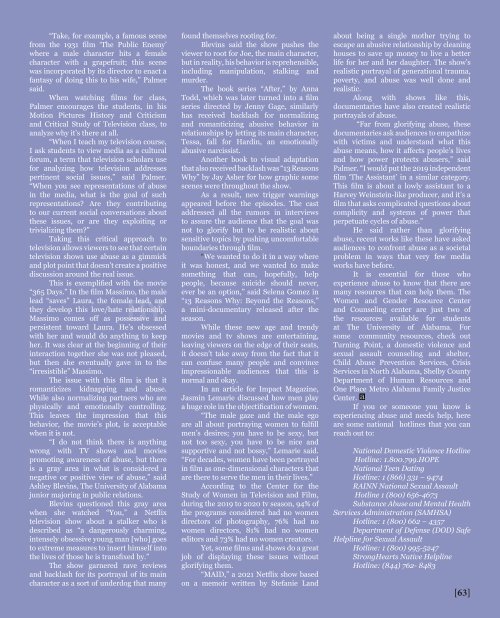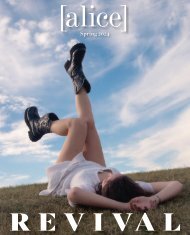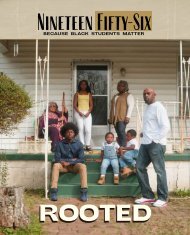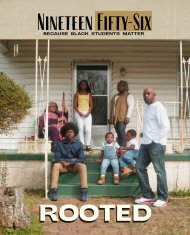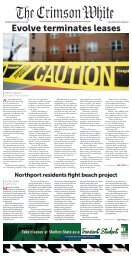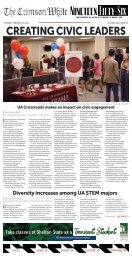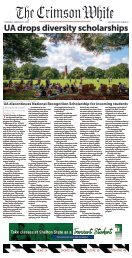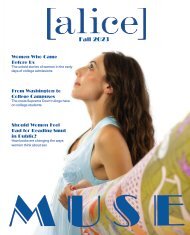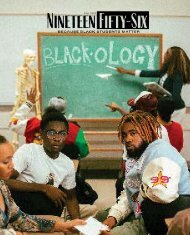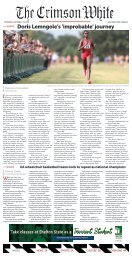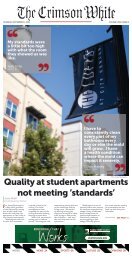Alice Vol. 7 No. 3
Charmed continues to inform college women on the issues that matter while also embracing our big sister role in the form of a college survival guide. In this issue, we have everything from a myth-busting UTI article to calling out performative activism efforts. We feature women who are artists, fashion designers and entrepreneurs. There are fool-proof date night looks to ease any new-love butterflies and a deep dive into how a TikTok subculture has revitalized a population’s love for reading. This issue is a celebration of love, and you can call us, charmed.
Charmed continues to inform college women on the issues that matter while also embracing our big sister role in the form of a college survival guide. In this issue, we have everything from a myth-busting UTI article to calling out performative activism efforts. We feature women who are artists, fashion designers and entrepreneurs. There are fool-proof date night looks to ease any new-love butterflies and a deep dive into how a TikTok subculture has revitalized a population’s love for reading. This issue is a celebration of love, and you can call us, charmed.
Create successful ePaper yourself
Turn your PDF publications into a flip-book with our unique Google optimized e-Paper software.
“Take, for example, a famous scene<br />
from the 1931 film ‘The Public Enemy’<br />
where a male character hits a female<br />
character with a grapefruit; this scene<br />
was incorporated by its director to enact a<br />
fantasy of doing this to his wife,” Palmer<br />
said.<br />
When watching films for class,<br />
Palmer encourages the students, in his<br />
Motion Pictures History and Criticism<br />
and Critical Study of Television class, to<br />
analyze why it’s there at all.<br />
“When I teach my television course,<br />
I ask students to view media as a cultural<br />
forum, a term that television scholars use<br />
for analyzing how television addresses<br />
pertinent social issues,” said Palmer.<br />
“When you see representations of abuse<br />
in the media, what is the goal of such<br />
representations? Are they contributing<br />
to our current social conversations about<br />
these issues, or are they exploiting or<br />
trivializing them?”<br />
Taking this critical approach to<br />
television allows viewers to see that certain<br />
television shows use abuse as a gimmick<br />
and plot point that doesn’t create a positive<br />
discussion around the real issue.<br />
This is exemplified with the movie<br />
“365 Days.” In the film Massimo, the male<br />
lead “saves” Laura, the female<br />
BY<br />
lead, and<br />
they develop this love/hate relationship.<br />
Massimo comes off as possessive and<br />
persistent toward Laura. He’s obsessed<br />
with her and would do anything to keep<br />
her. It was clear at the beginning of their<br />
interaction together she was not pleased,<br />
but then she eventually gave in to the<br />
“irresistible” Massimo.<br />
The issue with this film is that it<br />
romanticizes kidnapping and abuse.<br />
While also normalizing partners who are<br />
physically and emotionally controlling.<br />
This leaves the impression that this<br />
behavior, the movie’s plot, is acceptable<br />
when it is not.<br />
“I do not think there is anything<br />
wrong with TV shows and movies<br />
promoting awareness of abuse, but there<br />
is a gray area in what is considered a<br />
negative or positive view of abuse,” said<br />
Ashley Blevins, The University of Alabama<br />
junior majoring in public relations.<br />
Blevins questioned this gray area<br />
when she watched “You,” a Netflix<br />
television show about a stalker who is<br />
described as “a dangerously charming,<br />
intensely obsessive young man [who] goes<br />
to extreme measures to insert himself into<br />
the lives of those he is transfixed by.”<br />
The show garnered rave reviews<br />
and backlash for its portrayal of its main<br />
character as a sort of underdog that many<br />
found themselves rooting for.<br />
Blevins said the show pushes the<br />
viewer to root for Joe, the main character,<br />
but in reality, his behavior is reprehensible,<br />
including manipulation, stalking and<br />
murder.<br />
The book series “After,” by Anna<br />
Todd, which was later turned into a film<br />
series directed by Jenny Gage, similarly<br />
has received backlash for normalizing<br />
and romanticizing abusive behavior in<br />
relationships by letting its main character,<br />
Tessa, fall for Hardin, an emotionally<br />
abusive narcissist.<br />
Another book to visual adaptation<br />
that also received backlash was “13 Reasons<br />
Why” by Jay Asher for how graphic some<br />
scenes were throughout the show.<br />
As a result, new trigger warnings<br />
appeared before the episodes. The cast<br />
addressed all the rumors in interviews<br />
to assure the audience that the goal was<br />
not to glorify but to be realistic about<br />
sensitive topics by pushing uncomfortable<br />
boundaries through film.<br />
“We wanted to do it in a way where<br />
it was honest, and we wanted to make<br />
something that can, hopefully, help<br />
people, because suicide should never,<br />
ever be an option,” said Selena Gomez in<br />
“13 Reasons Why: Beyond the Reasons,”<br />
a mini-documentary released after the<br />
season.<br />
While these new age and trendy<br />
movies and tv shows are entertaining,<br />
leaving viewers on the edge of their seats,<br />
it doesn’t take away from the fact that it<br />
can confuse many people and convince<br />
impressionable audiences that this is<br />
normal and okay.<br />
In an article for Impact Magazine,<br />
Jasmin Lemarie discussed how men play<br />
a huge role in the objectification of women.<br />
“The male gaze and the male ego<br />
are all about portraying women to fulfill<br />
men’s desires; you have to be sexy, but<br />
not too sexy, you have to be nice and<br />
supportive and not bossy,” Lemarie said.<br />
“For decades, women have been portrayed<br />
in film as one-dimensional characters that<br />
are there to serve the men in their lives.”<br />
According to the Center for the<br />
Study of Women in Television and Film,<br />
during the 2019 to 2020 tv season, 94% of<br />
the programs considered had no women<br />
directors of photography, 76% had no<br />
women directors, 81% had no women<br />
editors and 73% had no women creators.<br />
Yet, some films and shows do a great<br />
job of displaying these issues without<br />
glorifying them.<br />
“MAID,” a 2021 Netflix show based<br />
on a memoir written by Stefanie Land<br />
about being a single mother trying to<br />
escape an abusive relationship by cleaning<br />
houses to save up money to live a better<br />
life for her and her daughter. The show’s<br />
realistic portrayal of generational trauma,<br />
poverty, and abuse was well done and<br />
realistic.<br />
Along with shows like this,<br />
documentaries have also created realistic<br />
portrayals of abuse.<br />
“Far from glorifying abuse, these<br />
documentaries ask audiences to empathize<br />
with victims and understand what this<br />
abuse means, how it affects people’s lives<br />
and how power protects abusers,” said<br />
Palmer. “I would put the 2019 independent<br />
film ‘The Assistant’ in a similar category.<br />
This film is about a lowly assistant to a<br />
Harvey Weinstein-like producer, and it’s a<br />
film that asks complicated questions about<br />
complicity and systems of power that<br />
perpetuate cycles of abuse.”<br />
He said rather than glorifying<br />
abuse, recent works like these have asked<br />
audiences to confront abuse as a societal<br />
problem in ways that very few media<br />
works have before.<br />
It is essential for those who<br />
experience abuse to know that there are<br />
many resources that can help them. The<br />
Women and Gender Resource Center<br />
and Counseling center are just two of<br />
the resources available for students<br />
at The University of Alabama. For<br />
some community resources, check out<br />
Turning Point, a domestic violence and<br />
sexual assault counseling and shelter,<br />
Child Abuse Prevention Services, Crisis<br />
Services in <strong>No</strong>rth Alabama, Shelby County<br />
Department of Human Resources and<br />
One Place Metro Alabama Family Justice<br />
Center.<br />
If you or someone you know is<br />
experiencing abuse and needs help, here<br />
are some national hotlines that you can<br />
reach out to:<br />
National Domestic Violence Hotline<br />
Hotline: 1.800.799.HOPE<br />
National Teen Dating<br />
Hotline: 1 (866) 331 – 9474<br />
RAINN National Sexual Assault<br />
Hotline 1 (800) 656-4673<br />
Substance Abuse and Mental Health<br />
Services Administration (SAMHSA)<br />
Hotline: 1 (800) 662 – 4357<br />
Department of Defense (DOD) Safe<br />
Helpline for Sexual Assault<br />
Hotline: 1 (800) 995-5247<br />
StrongHearts Native Helpline<br />
Hotline: (844) 762- 8483<br />
[63]


